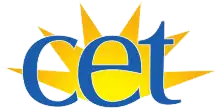WCET (TV)
WCET, virtual channel 48 (UHF digital channel 17), is a Public Broadcasting Service (PBS) member television station licensed to Cincinnati, Ohio, United States. The station is owned by the Greater Cincinnati Television Educational Foundation,[1][2] a subsidiary of Public Media Connect. WCET was the first licensed public television station in the United States.[3] Its studios are located in the Crosley Telecommunications Center on Central Parkway in Cincinnati, and its transmitter is located on Chickasaw Street in the Mount Auburn section of Cincinnati. Master control operations are based at the studios of sister PBS member station WPTD in Dayton.
 | |
| Cincinnati, Ohio United States | |
|---|---|
| Channels | Digital: 17 (UHF) Virtual: 48 (PSIP) |
| Branding | CET PBS |
| Programming | |
| Affiliations | 48.1: PBS 48.2: Create 48.3: CET Arts |
| Ownership | |
| Owner | Public Media Connect (The Greater Cincinnati Television Educational Foundation[1][2]) |
| WPTD, WPTO (Think TV) | |
| History | |
First air date | July 26, 1954 |
Former channel number(s) | Analog: 48 (UHF, 1954–2009) |
| Analog/DT1: NET (1954–1970) DT2: PBS World (2003–2009) DT3: PBS World (2009–2010) | |
Call sign meaning | Cincinnati Educational Television |
| Technical information | |
Licensing authority | FCC |
| Facility ID | 65666 |
| ERP | 274 kW |
| HAAT | 325 m (1,066 ft) |
| Transmitter coordinates | 39°7′27″N 84°31′18″W |
| Links | |
Public license information | Profile LMS |
| Website | www |
On cable, the station is available on channel 13 on most systems in the market.
History
The Federal Communications Commission (FCC) assigned channel 48 to WCET in 1951. A corporate charter and construction permit were granted in 1953. WCET began broadcasting on July 26, 1954, from a converted closet on the third floor of Music Hall. The first day of programming began with Tel-A-Story, a half-hour reading program by the Cincinnati library.[4][5][6][7] On March 11, 1955, the FCC granted WCET the first non-commercial educational broadcast license in the country.[8] WCET remained at Music Hall until 1959, when it moved to the former WLWT studios on Chickasaw Street.[4]

Originally, WCET was funded through local school levies. However, a failed levy in 1966 forced the station to seek other sources of funding. In 1968, WCET held its inaugural Action Auction, raising $31,000 in two days.[4]
In 1976, the station moved to its present studio location at the Crosley Telecommunications Center, which it now shares with the market's two main public radio stations, WVXU-FM and WGUC-FM.[9]
In 1981, Warner Cable agreed to carry four additional channels of instructional programming provided by WCET.[4]
In the late 1990s, like PBS member stations in many larger television markets, WCET partnered with the for-profit company Lakeshore Learning Materials to operate a retail store. WCET took a 25% share in the Channel 48 Store of Knowledge, which went towards the station's endowment fund. The 5,300-square-foot (490 m2) store sold merchandise related to PBS shows at the Kenwood Towne Centre from November 23, 1996,[10] until the chain's bankruptcy and liquidation in 2001.[11] The Discovery Channel Store opened in its place the following September.[12]
Once simply branded "Channel 48" and later as "WCET48", the station simplified its name to "CET" on September 16, 2003, moving away from its call sign and channel number to indicate its increasing focus on online services. It began an IP-based on-demand video service via its website, CETconnect.
On May 8, 2009, the Greater Cincinnati Television Educational Foundation and Greater Dayton Public Television (owners of that market's PBS station WPTD) formed the umbrella non-profit organization Public Media Connect. Both WCET and WPTD operate as subsidiaries with separate branding and fundraising efforts.[13][14] The merger resulted in the July 2010 transfer of WCET's master control operations to WPTD's facilities in Dayton.[15]
WCET and the ThinkTV channels were off the air (and not available through any other providers) from just after 4 p.m. on July 5 until 11:40 a.m. on July 9, 2019 due to the failure of a multiplexer in the master control power supply at ThinkTV in downtown Dayton.[16][17]
Digital television
Digital channels
The station's digital signal is multiplexed:
| Channel | Video | Aspect | PSIP Short Name | Programming[18] |
|---|---|---|---|---|
| 48.1 | 1080i | 16:9 | CETHD | Main WCET programming / PBS |
| 48.2 | 480i | 4:3 | Create | CET Create |
| 48.3 | 16:9 | CET Art | CET Arts |
CET Create and CET Arts are also available on the digital cable tiers of local cable provider Charter Spectrum.[19] "CETWorld", affiliated with PBS World (now branded simply as World), was carried on channel 48.2 from 2003 to January 5, 2009, and on 48.3 from September 24 of that year to February 1, 2010. During this time, it was also carried by Spectrum's predecessor, Time Warner Cable. World programming continues to be carried on ThinkTV World, a subchannel of sister station WPTO.
On February 1, 2010, CETWorld was replaced with CET Arts on digital subchannel 48.3. CET launched CET Arts, the first local 24-hour cultural service of its kind on February 1, 2010. CET Arts showcases drama, visual arts, dance and music programming ranging from symphonic to bluegrass.[20]
On March 4, 2012 at 6:49 p.m., CET aired its first live high definition pledge break from its studio, around the concert program Under the Streetlamp.
Analog-to-digital conversion
WCET signed on its digital signal on UHF channel 34 on December 4, 2002; it began broadcasting in high definition 24 hours a day on October 1, 2005.[21] The station discontinued regular programming on its analog signal, over UHF channel 48, at 12:01 a.m. on May 1, 2009.[22] The station's digital signal remained on its pre-transition UHF channel 34,[23] using PSIP to display WCET's virtual channel as 48 on digital television receivers.
Original programming
The following television series were previously or are currently produced by WCET:
- Action Auction – televised station fundraiser
- Congressional Outlook – national public affairs program hosted by Patrick Tyler; joint venture with Congressional Quarterly[24]
- Focus 48 – local public affairs program
- Showcase with Barbara Kellar – local arts and cultural series airing on CET Arts
- It's Academic (1960s–1980s) – local version, in partnership with WLWT
- Lilias, Yoga and You[25] (1972–1999)
See also
References
- "About CET". CETConnect. Greater Cincinnati Television Education Foundation. Archived from the original on December 7, 2010. Retrieved 2010-03-18.
CET's legal name is Greater Cincinnati Television Education Foundation
- WCET, TV Station Profiles & Public Inspection Files, Federal Communications Commission
- Watson-Rouslin 1978, p. 53.
- Forty Years of TV Worth Watching (PDF). Greater Cincinnati Television Educational Foundation. 1994. Archived from the original (PDF) on December 15, 2005.
- "Ohio Library Association Bulletin". Ohio Library Association Bulletin. Ohio Library Association. 1953.
Cincinnati's community-owned educational television, WCET, went on the air July 26, with 'Tel-a-Story,' by the Cincinnati Public Library as the opening program.
- Kiesewetter, John (July 28, 2014). "WCET-TV got its start 60 years ago". The Cincinnati Enquirer. Gannett Company. Retrieved December 2, 2014.
- Knippenberg, Jim (September 26, 2004). "ABC News to air from Devou Park". The Cincinnati Enquirer. Gannett Company. Retrieved December 2, 2014.
- "Non-Commercial Education Television Broadcast Station License Official No. 1" (PDF). Federal Communications Commission. March 11, 1955. Archived from the original (PDF) on December 19, 2005.
- "Cincinnati's "Leading Lady of Architecture" Stars in Her Very Own Show!". CETConnect. Greater Cincinnati Television Educational Foundation. Archived from the original on 2007-06-12. Retrieved 2007-06-23.
- Miller, Nick (1996-11-06). "WCET cashing in on Knowledge" (fee required). The Cincinnati Post. E. W. Scripps Company. p. B9. Retrieved 2010-03-18.
Los Angeles-based Lakeshore Learning Materials operates 29 Store of Knowledge outlets in agreements with PBS stations in 18 cities, most of them in markets much larger than Cincinnati. ... Channel 48 decided for the time being to have a 25 percent ownership stake in the store, station officials said. ... The Channel 48 Store of Knowledge will have its grand opening Nov. 23. The 5,300-square-foot store features more than 5,000 products ... linked to PBS programming.
- "Kenwood's Store of Knowledge to close". Cincinnati Business Courier. American City Business Journals. 2001-04-12. Retrieved 2010-03-18.
- "Discovery Channel Store to open at Kenwood". Cincinnati Business Courier. American City Business Journals. 2001-07-16. Retrieved 2010-03-18.
- "ThinkTV and CET to Merge" (Press release). Greater Dayton Public Television. 2008-10-31.
- "ThinkTV, CET form Public Media Connect Inc". Business Courier of Cincinnati. 2009-05-08. Retrieved 2009-05-08.
- Kiesewetter, John (2010-07-19). "Merger cuts CET jobs". The Cincinnati Enquirer. Gannett Company. Retrieved 2010-07-20.
Five full-time positions, including both master control operators, have been eliminated by CET. ... Starting last weekend, CET's signal was being sent from Dayton to the station here, and then to the Fairview Heights tower and Time Warner cable, employees say.
- Schroeder, Kaitlin (July 9, 2019). "ThinkTV is back on air after equipment failure". Dayton Daily News. Retrieved July 9, 2019.
- Kiesewetter, John (July 9, 2019). "WCET-TV, WPTD-TV And WPTO-TV Back On Air". WVXU. Cincinnati Public Radio. Retrieved July 9, 2019.
- RabbitEars TV Query for WCET
- "CET Television Program Channel Information". CETConnect. Greater Cincinnati Television Educational Foundation. Retrieved 2010-03-18.
- "CET Arts". CETConnect. Greater Cincinnati Television Educational Foundation. Retrieved 2010-03-18.
- "CET Digital Television". CETConnect. Greater Cincinnati Television Educational Foundation. Retrieved 2010-03-18.
- List of Digital Full-Power Stations
- CDBS Print
- "About WCET". Greater Cincinnati Television Educational Foundation. Archived from the original on February 4, 1998.
- Watson-Rouslin 1978, pp. 53–54.
Further reading
- Watson-Rouslin, Virginia (February 1978). "Channel 48: A Muttering Voice in the T.V. Wilderness". Cincinnati. Greater Cincinnati Chamber of Commerce. 11 (5): 52–57. Retrieved November 17, 2009.
External links
- CETConnect – official website of WCET-TV
- CET 50th Anniversary at the Wayback Machine (archived December 15, 2005)
- WCET in the FCC's TV station database
- BIAfn's Media Web Database -- Information on WCET-TV
